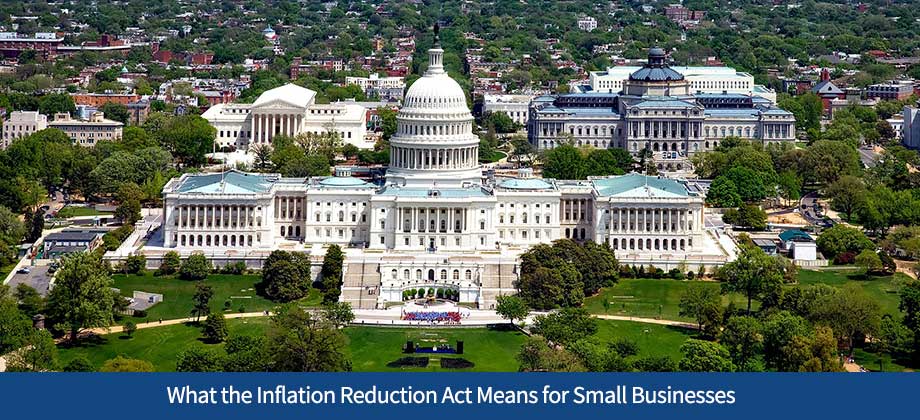What the Inflation Reduction Act Means for Small Businesses

Signed into law by President Biden in mid-August of 2022, the Inflation Reduction Act has multiple goals: to reduce the deficit, combat inflation, provide investments to energy production and manufacturing here in the United States, and lower carbon emissions by 40 percent over the next 8 years. The act will also let Medicare negotiate prescription drug prices. But what does the Inflation Reduction Act mean for small businesses? Read on to learn more…
According to Whitehouse.gov, one of the big ways the Inflation Reduction Act aims to help small businesses is through cost-reduction measures: “The Inflation Reduction Act will reduce costs for small businesses by maintaining lower health care costs, supporting energy-saving investments, and bolstering supply chain resiliency.” Let’s talk a bit about each of these areas.
Healthcare Savings
The Inflation Reduction Act aims to extend the American Rescue Plan’s tax credit support for Affordable Care Act (ACA) plans into 2025. Because the ACA covers nearly 2.6 million business owners and self-employed workers, this is an important measure to spur the growth of small businesses and increase job creation, as people may be more likely to take the leap of starting a new business knowing they can still maintain health coverage.
Energy Savings
Several provisions in the Act offer incentives for turning to more energy-saving business operations. For instance, there’s the tax credit covering 30 percent of the cost it will take to switch to solar power. There’s also a tax credit of up to $5 a square foot for improvements made to increase energy efficiency within a business, and finally another tax credit covering 30 percent of the cost to purchase clean commercial vehicles.
Research Savings
The Research and Development (R&D) tax credit has not historically been easy for small businesses to take advantage of. The Inflation Reduction Act attempts to bolster investments in research and innovation by small businesses by doubling the tax credit for them–from $250K to $500K. This refundable tax credit can be applied to payroll taxes, product development, and technology.
Supply Chain Assistance
We’re all too familiar with what’s happening in our supply chains right now. What the Inflation Reduction Act wants to do is provide support to U.S. supply chains in the fields of solar, wind, carbon, and clean hydrogen. According to Whitehouse.gov, “The legislation includes targeted tax incentives aimed at manufacturing U.S.-sourced materials like batteries, solar, and wind parts, and technologies like carbon capture systems and electrolyzers to make hydrogen.” The thought is that by investing in these areas domestically, we’ll create more jobs in clean-energy fields.
Our expert loan consultants at ARF Financial are well versed in all things finance, and we’re here to help you navigate the world of small business ownership and all the questions that come with it–including those related to new legislation from Washington. Pay a virtual visit to our loan consulting team today and learn more about what makes them such experts.

